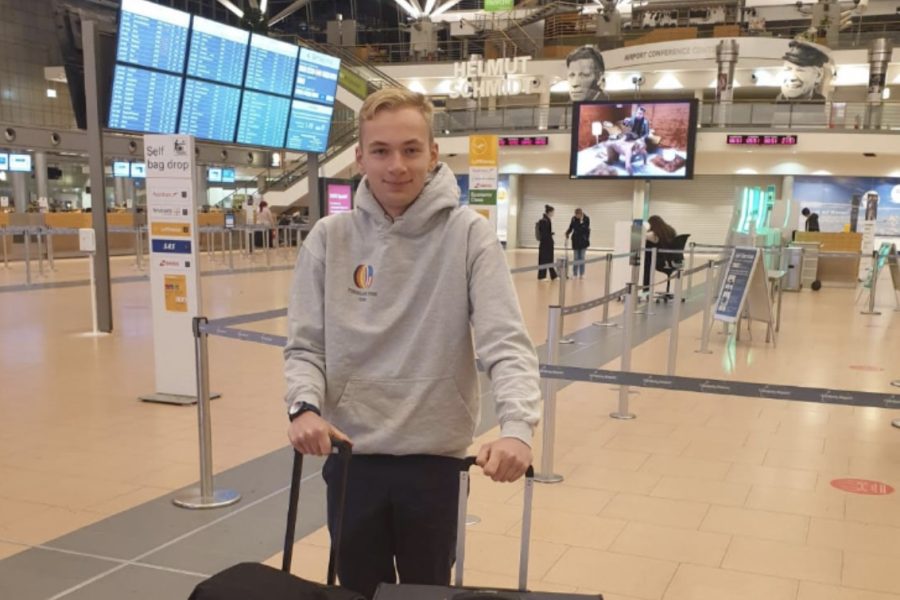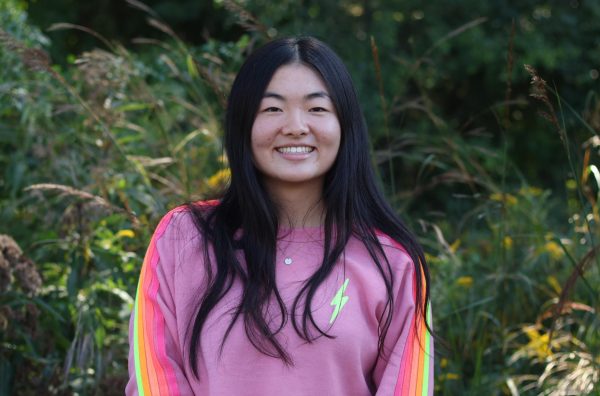Finnlay Roellig: A German exchange student’s transition to WHS
Credit: Courtesy of Finnlay Roellig
After arriving at Wayland High School almost two months into the school year, Roellig finds that his transition to the new environment has been relatively smooth. “I think the most important thing is just being open to everything and everyone,” Roellig said. “If you just stay to yourself and sit at the back of the class without speaking to anyone, you won’t really get settled in. You have to be open minded if you come to a new place.”
January 11, 2023
On Oct. 28, junior exchange student Finnlay Roellig moved across the world with just two suitcases, eagerly awaiting his exchange year in the United States. Roellig, who is from Germany, is part of an exchange program that allows him to spend the bulk of his junior year taking classes at WHS.
Lütjenburg, a small town in the far north of Germany, is home to around 5,000 residents. It is 3,631 miles from Wayland and borders the Baltic Sea. However, for Roellig, both places are home.
“I have two little host brothers, which is new for me because I’m an only child at home,” Roellig said. “I really enjoy it.”
Roellig quickly found there to be many cultural differences between Germany and the US. From the architecture of the school, to the general learning environment, Roellig has discovered new aspects of the American lifestyle every day. Although he initially found the language barrier difficult, Roellig has adjusted quickly.
“My experience so far has been absolutely positive,” Roellig said. “I like the whole school building and I like the school system. This school is actually much newer than my school back in Germany, [Gymnasium Lütjenburg]. We work with computers, [which we don’t do in Germany]. [There’s] a lot of differences that make life for me really special, [like the] free lunches and free transportation.”
Additionally, in Germany, students aren’t allowed to choose any courses on their schedule or make any changes to the schedule that was assigned to them. As contrasting as the schools are, Roellig has been embracing the new curriculum and experiences. He finds that a lot of the topics he is learning here at WHS are completely different from what he was learning back at his school in Germany.
“My favorite class [is either] Advanced Placement government and politics or United States history because pretty much everything in US history and US government and politics is just not a topic in Germany,” Roellig said. “We learned about European and German history. So every class I go to, I just learn something completely new.”
Roellig also finds that the teachers at WHS and their teaching styles are much different then in Germany.
“Teachers are stricter in Germany, and you get more homework and tests,” Roellig said. “We [wouldn’t be able to watch] YouTube videos or documentaries in class. That’s impossible. Also, the quizzes are also more difficult because we don’t have multiple choice.”
The application process to be an exchange student at Wayland High School is rigorous, and one that involved a lot of paperwork, Roellig recalled. Roellig is here on the Congress-Bundestag Youth Exchange (CBYX) scholarship, which is a scholarship jointly funded by the US government and the German Congress.
“I heard about the scholarship at school,” Roellig said. “There was a flier at school, and I applied on the last possible day.”
A multitude of organizations are involved with the scholarship, since it’s a complicated process that involves a lot of funding and planning.
“[The German] Congress just [provides] the money,” Roellig said. “[Then they choose] an organization – mine is the American Field Service (AFS) – who organizes everything. They plan the flights, the host families and the school, while Congress just gives them money.”
After Roellig’s application was checked, he got an invitation to attend an appointment, which he attended with some other students who applied for the scholarship. Of the students who attended, three were selected to proceed to the next round. The elimination rounds continued until a final decision could be made.
“We had an interview with the representative from Congress [who represents the area we’re from], who then made the final decision [regarding the scholarship],” Roellig said.
Even though the process has had its ups and downs, Roellig has kept an open mind to everything and everyone, which he ultimately believes improved his experience.
“I think the most important thing is just being open to everything and everyone,” Roellig said. “If you just stay to yourself and sit at the back of the class without speaking to anyone, you won’t really get settled in. You have to be open minded if you come to a new place.”





![Last Wednesday, the Wayland School Committee gathered to discuss a number of topics regarding the health curriculum and Innovation Career Pathway course. Another large topic of conversation was the ways to potentially mitigate distracting cell phone usage. "These [phones] are going to distract your learning and social relationships," Superintendent David Fleishman said. "That's concrete right there."](https://waylandstudentpress.com/wp-content/uploads/2025/06/Screenshot-2025-06-04-at-9.49.31 PM-1200x886.png)



























![Troy Hoyt finishes the Boston Marathon, running for the Hoyt Foundation. T. Hoyt is the son of Hoyt Foundation CEO Russ Hoyt.
“[Running a marathon] might seem like a big thing, when it’s presented to you at first, but if you break it up and just keep telling yourself, “Yes, you can,” you can start chipping away at it. And before you know it, you’ll be running the whole 26 miles, and you won’t even think twice about it.” T. Hoyt said.](https://waylandstudentpress.com/wp-content/uploads/2025/04/C36E8761-1CBB-452E-9DF2-543EF7B1095E_1_105_c.jpeg)













































